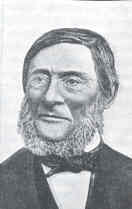
Ole Gabriel Gabrielsen Ueland
Encyclopedia

Norway
Norway , officially the Kingdom of Norway, is a Nordic unitary constitutional monarchy whose territory comprises the western portion of the Scandinavian Peninsula, Jan Mayen, and the Arctic archipelago of Svalbard and Bouvet Island. Norway has a total area of and a population of about 4.9 million...
political leader and member of the Norwegian Parliament. Historians credit him with having popularized politics in Norway, paving the way for individuals of underprivileged backgrounds to rise to positions of political importance.
Ueland was born into a peasant
Peasant
A peasant is an agricultural worker who generally tend to be poor and homeless-Etymology:The word is derived from 15th century French païsant meaning one from the pays, or countryside, ultimately from the Latin pagus, or outlying administrative district.- Position in society :Peasants typically...
family on the farm of Skaaland, in the parish of Lunde, in the landscape of Dalane
Dalane
Dalane is a traditional district in the south-western part of Norway, consisting of the municipalities Lund, Sokndal, Eigersund and Bjerkreim. Dalane is one of the 15 districts in Western Norway....
, on the southwest coast of Norway. The next oldest of four, he became an orphan in 1814. Although his formal education had been limited to random local lessons, he had proven an unusual aptitude for learning and a voracious appetite for reading. When he was 17, he was asked to teach the children in the area. By 1827, he had by way of marriage acquired the farm Ueland, and was installed as the sexton
Sexton (office)
A sexton is a church, congregation or synagogue officer charged with the maintenance of its buildings and/or the surrounding graveyard. In smaller places of worship, this office is often combined with that of verger...
in the local church in Heskestad
Heskestad
Heskestad is a village and parish located in Lund municipalityin Rogaland county, Norway.Heskestad was part of Helleland clerical district until 1820 when it became part of Lund clerical district. Heskestad parish was created as Heskestad formannskapsdistrikt in 1837. On 1 January 1965 the majority...
in the municipality of Lund
Lund, Norway
Lund is a municipality in Rogaland county, Norway. The administrative center of the municipality is the village of Moi. The parish of Lunde was established as a municipality on 1 January 1838...
.
He was elected to the Norwegian Parliament in 1833, representing the rural constituency of Stavanger Amt (today named Rogaland
Rogaland
is a county in Western Norway, bordering Hordaland, Telemark, Aust-Agder and Vest-Agder. It is the center of the Norwegian petroleum industry, and as a result of this, Rogaland has the lowest unemployment rate of any county in Norway, 1.1%...
). He remained a parliament member until 1869, having been re-elected thirteen times. He became the leader for the peasant and farmer's movement in politics and earned respect for his deliberate and wise political outlook.
Bjørnstjerne Bjørnson
Bjørnstjerne Bjørnson
Bjørnstjerne Martinius Bjørnson was a Norwegian writer and the 1903 Nobel Prize in Literature laureate. Bjørnson is considered as one of The Four Greats Norwegian writers; the others being Henrik Ibsen, Jonas Lie, and Alexander Kielland...
wrote of him:
- Though he is a farmer behind his plough
- and a sailor in his boat
- he thought as well as anyone
- in all the King's council
- When he met in parliament
- to promote the cause of farmers
- every word gave birth to a ray
- in the people's young day.

